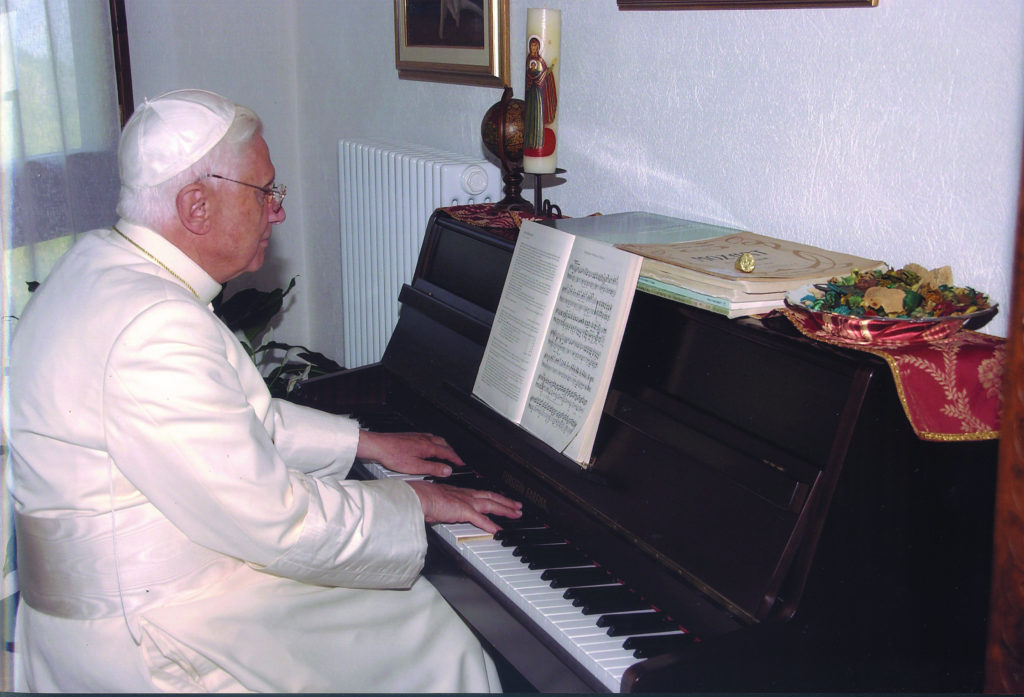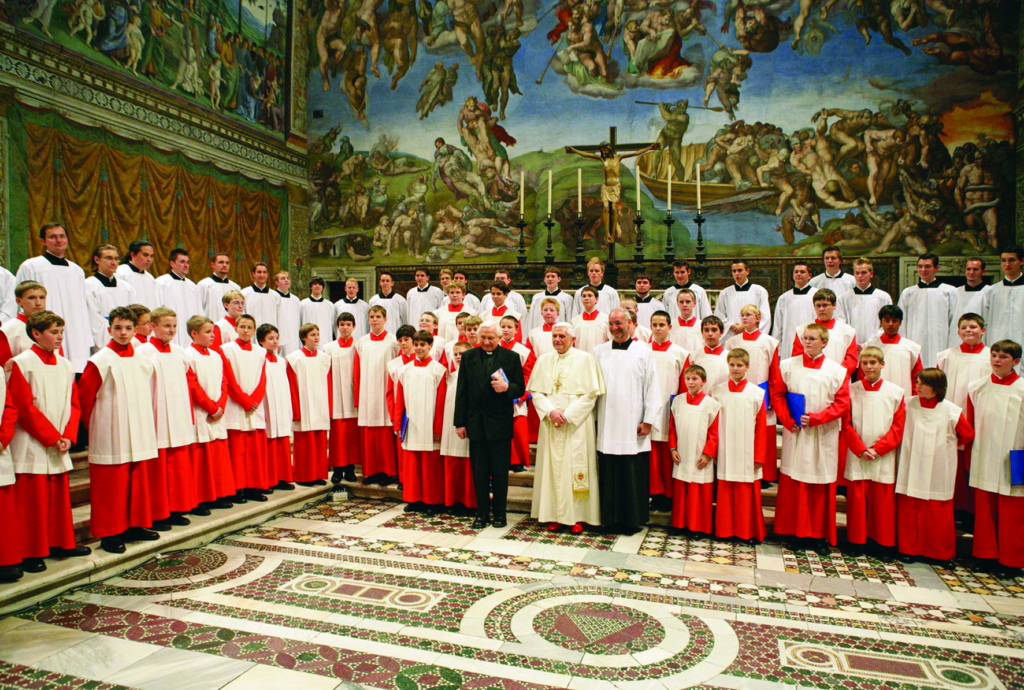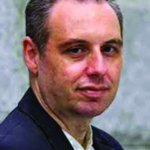Music was a source of deep theological reflection for the Pope
By Maestro Aurelio Porfiri

The death of Benedict XVI has led many to reflect on the legacy of Joseph Ratzinger, a legacy which in my opinion is much more complex than what we are led to believe. Certainly in the decades to come many studies will analyze the life and work of this theologian and Pope who has marked the life of the Church for the last 70 years.
One aspect that I believe is important, and mostly overlooked, is his love for music. Joseph Ratzinger was very fond of music — especially, but not only, that of Mozart. Of this composer, in a speech offered on the occasion of a concert offered to the Pope by the Pontifical Academy of Sciences and in which Mozart’s famous Requiem was performed, he said:
“Allow me, however, to say once again that a special affection binds me, I might say, has always bound me, to this supreme musician. Every time I hear his music I cannot but think back to my parish church when I was a boy when, on feast days, one of his ‘Masses’ resounded. I felt in my heart that a ray of Heaven’s beauty had reached me, and I have this sensation every time, today too, that I hear this great, dramatic and serene meditation on death. In Mozart everything is in perfect harmony, every note, every musical phrase, and it could not be otherwise. Even counterpoints are reconciled and the Mozart’esche Heiterkeit, the ‘Mozartian serenity’ enfolds everything and at every moment. This is a gift of God’s grace, but it is also the fruit of the lively faith of Mozart, who, especially in his sacred music, succeeds in making the luminous response of Divine Love shine out. This gives hope, even when human life is lacerated by suffering and death.”
An authentic reflection on the music of the great composer is contained in these words; it is not simply comments suited to the circumstances.
Then the Pope continues:
“In the last letter, dated April 4, 1787, that he wrote to his dying father, he spoke in this way concerning the last phase of life on earth: ‘… for some years I have become so familiar with this sincere and most beloved friend of man (death), whose image, for me, not only has nothing terrifying about it but even appears very tranquilizing and comforting! And I thank my God for granting me the good fortune of having the opportunity to recognize in it the key to our happiness. I never go to bed without thinking that I might perhaps be dead on the morrow. Yet not one of those who know me would be able to say that in company I am sad or in a bad mood. And for this good fortune I thank my Creator every day, and I wish for it with all my heart for all my peers.’ It is a letter that shows a deep and simple faith which likewise emerges in the prayer of the great Requiem and leads us, at the same time, to love intensely the events of earthly life as gifts of God and to rise above them, looking serenely at death as the ‘key’ that opens the door to eternal happiness.”
It is evident from these words that the Pope had meditated for a long time on the compositions of this musical genius, as they had been a source of great reflection for him, together with theological and philosophical works. I believe this is the right approach to art – to music – to understand that they are a way to knowledge, as Ludwig van Beethoven stated as well.
Benedict XVI also nourished his spirit with creative depths in music and art.
In a speech on June 24, 2006, after a concert offered to him by Maestro Domenico Bartolucci, Benedict XVI stated:
“An authentic renewal of sacred music can only happen in the wake of the great tradition of the past, of Gregorian chant and sacred polyphony.
“For this reason, in the field of music as well as in the areas of other art forms, the Ecclesial Community has always encouraged and supported people in search of new forms of expression without denying the past, the history of the human spirit which is also a history of its dialogue with God.”
It seems that these words are quite obvious; from an authentically Catholic point of view, they are perfectly uncontestable.

Concert by the Regensburg Cathedral Choir in the Sistine Chapel in the presence of Benedict XVI and his brother Georg (Photo Grzegorz Galazka)
Yet how far they are from what we hear in our churches, where the music we hear is only the echo of commercial jingles and fourth-rate songs. How can we fail to understand that only tradition can be the guide for just progress? Certainly Benedict XVI says this because he well understood that this was the only path to follow.
And yet, it must be noted with some bitterness that, if it is true that he had the right vision of the problem, he did not, however, as Pope, do much to find a solution. All of us Church musicians hoped for some decisive action against the cheesy music we have been listening to for too many years now, but this action never came. Sure, nice words, but not many facts. This feeling is shared by many of us who were hoping for a breakthrough after so many decades of ugliness. And if there was a Pope who could lead us to this turning point it was he, but he didn’t. For what reason did this happen?
“An authentic renewal of music can only happen in the wake of the great tradition of the past”
–Benedict XVI
As many observers have said, he was a man of great meekness and shyness, as he himself recognized; despite his many fine qualities, he did not have the attitude of a leader, but rather was a professor who found himself acting as Pope. Despite the fact that he personally deeply and sincerely loved music, the current musical environment in the Catholic Church is mostly made up of people who have little or no musical training, and there does not seem to be a will for this to change. Pope Benedict tried to make it clear that this issue was important but, as in other cases, he was not listened to.
Unfortunately, in today’s dramatic situation in the Catholic Church, we seem to be dealing with a “patient” in his “terminal” phase. If it is true that Jesus promised to be with us until the end of time, we have not promised to be with Him. He is there, but where are we?
 Aurelio Porfiri has published more than 200 musical compositions in Italy, China, USA, Germany and France. He has published more than 60 books, is a contributor to Catholic blogs and magazines, and is the founder and artistic director of the publishing company Chorabooks. He is the Honorary Master and Organist for the Church of Santa Maria dell’Orto in Rome and Saint Joseph Seminary Chapel in Macau, China.
Aurelio Porfiri has published more than 200 musical compositions in Italy, China, USA, Germany and France. He has published more than 60 books, is a contributor to Catholic blogs and magazines, and is the founder and artistic director of the publishing company Chorabooks. He is the Honorary Master and Organist for the Church of Santa Maria dell’Orto in Rome and Saint Joseph Seminary Chapel in Macau, China.
He edits several newsletters and has regular programs on his YouTube channel Ritorno a Itaca. Find him at aurelioporfiri.com. Maestro Porfiri resides in Rome.l





Facebook Comments